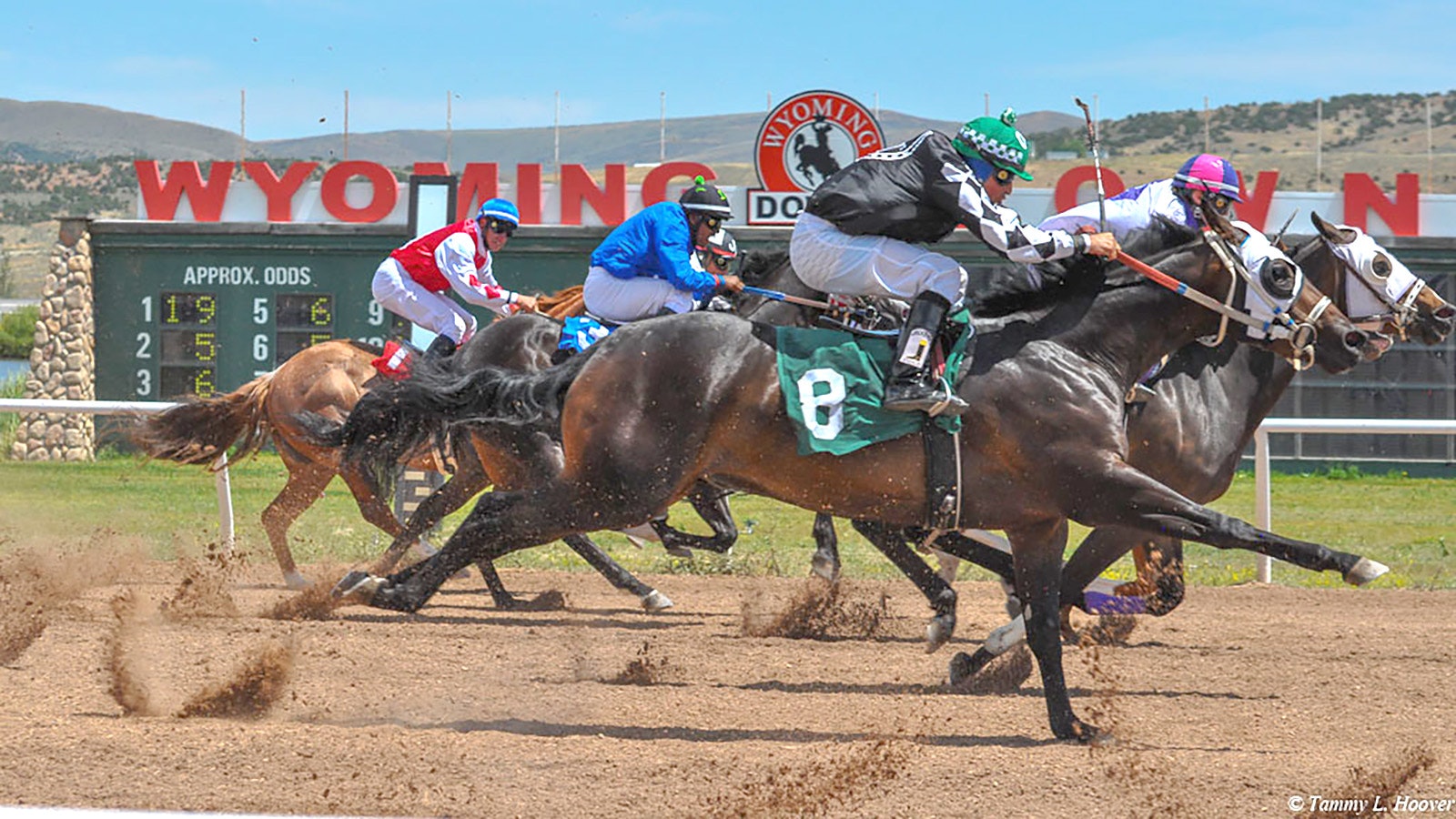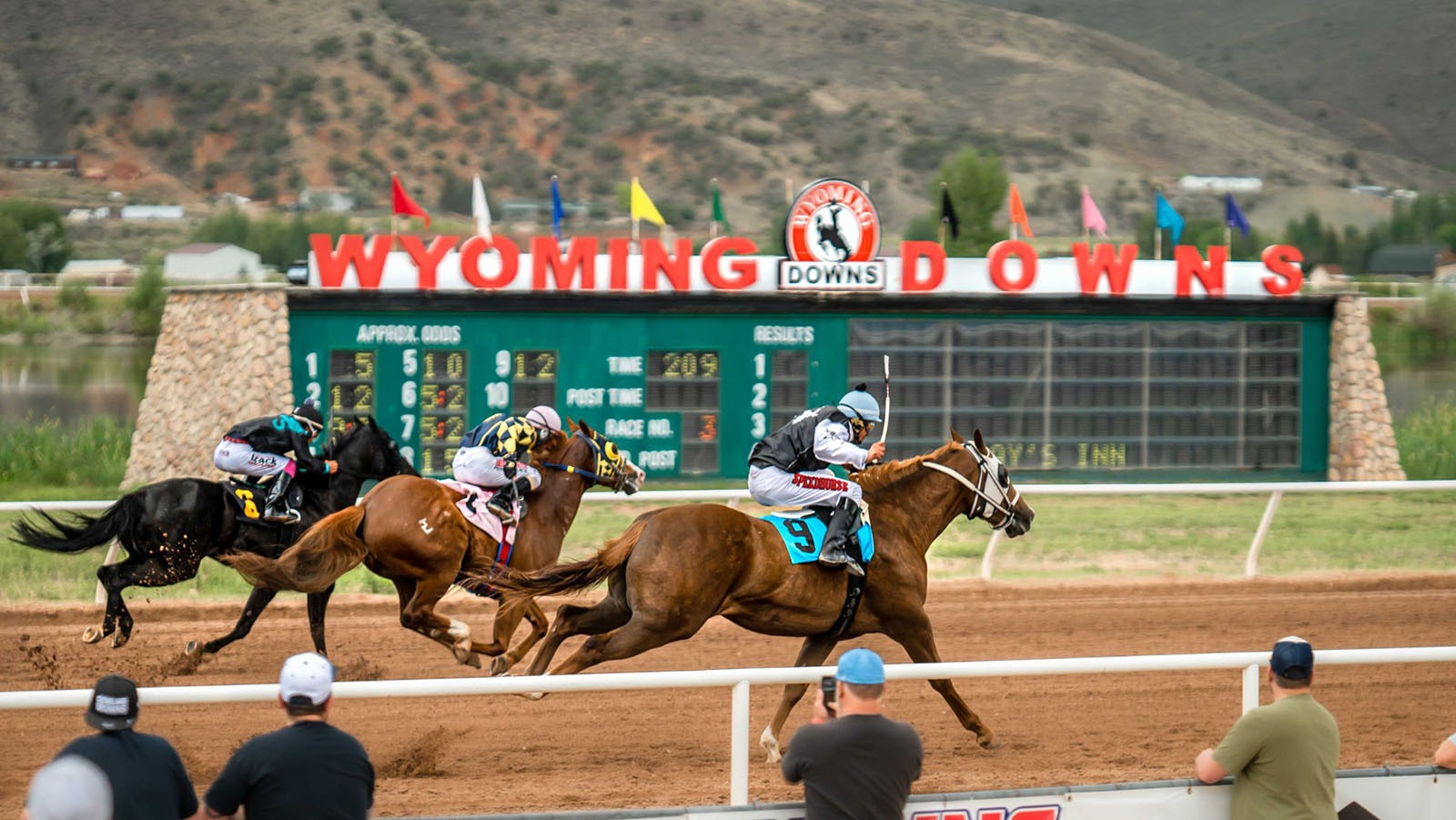It’s been a rough summer at Wyoming Downs horse racing track.
Five horses have been euthanized as a result of injuries sustained at the Evanston racetrack during the 2023 racing season.
Two horses died earlier this month, just weeks following a single day in June when three horses were also put down after suffering injuries while racing.
The more recent horse deaths happened on the weekends of July 1-2 and July 8-9.
Wyoming Downs owner Eric Nelson told Cowboy State Daily neither of these two horses fell to the ground while racing, and one still crossed the finish line. The three horses that had to be euthanized in June had all fallen while running the track.
Questions Posed
The Wyoming Gaming Commission addressed the horse deaths at a special meeting held Wednesday morning in Casper, questioning track authorities about what’s causing the spate of fatal horse incidents.
An investigation was already underway into the three horses that died June 17. Wyoming Gaming Commission Executive Director Charles Moore said Wyoming Downs also is bringing in its own consultant to investigate.
As of Wednesday’s meeting, there were no clues into or explanations for the horse deaths.
Gaming Commissioner Dennis Boal took a sharp stance on the issue, requesting a “working theory” of conclusions from the state’s report despite the fact it has not yet been released.
“Saying that it’s complicated and difficult to ascertain the reason is not very satisfying when you’re sitting up here,” he said. “I’m a little bit disenchanted that all I’ve been hearing is, ‘We don’t know why it happened, it’s difficult to ascertain.’”
Moore and others stressed that to speculate on the results of the investigation before it is completed would be unwise. Moore said toxicology reports have been returned on the horses and none had illegal substances in their systems.

Outside Reaction
The three initial horse deaths drew outrage from some who attended the races where they died, national media attention and the animal rights group People for the Ethical Treatment of Animals (PETA).
Despite the attention and pressure, Nelson made no changes to the racing operations at the track, expressing confidence Wyoming Downs had done nothing wrong.
On Wednesday, Nelson said he considers the input of his staff, jockeys and trainers far above all else.
“I do not take into consideration PETA,” he told the Gaming Commission. “I’m not going to bow to PETA. I’m not going to bow to anyone in those areas. I will bow to jockeys and trainers.”
Nelson and Gaming Commission President Troy Broussard said horse racing is a dangerous sport and there will always be injuries involved.
Although Nelson described the horse deaths as “a tragic situation” and that claims his staff aren’t concerned are “ridiculous,” he said it’s the duty of horse owners to determine if their animals are fit to compete.
All 2-Year-Olds
All five of the quarter horses that died were 2-year-olds that suffered shoulder injuries.
Starting Sunday, Wyoming Downs started prohibiting all rookie 2-year-old horses from racing.
“We had to make a move. We knew we had to do at least something,” Wyoming Downs General Manager Frank Lamb said.
He said the track considered pausing all racing, but narrowed their focus when considering that the only horses that died were 2-year-olds.
“No one thought that was a bad idea,” Lamb said.
PETA Senior Vice President Kathy Guillermo told Cowboy State Daily on Wednesday that although they find restricting the 2-year-olds “a good first step,” it’s still not enough.
“As we recommended to Wyoming Downs a month ago, racing needs to be suspended and comprehensive safety protocols need to be put in place,” she said. “Horses needed to be observed by track veterinarians when they train, medical records should be examined, horses who have been previously sore or injured must be scrutinized, all medication use must be stopped in the two weeks before a race — if horses need it, they should not be racing — and more.”
Moving Parts
Lamb acknowledged the severity of the situation, but also said it’s difficult to determine exactly what has led to the horse injuries.
“There’s a lot of moving parts, it’s not just the racetrack,” he said. “There’s other issues here that we’re all going to have to talk about.”
Track consultant Steve Wood mentioned during the meeting that young horses often suffer micro fractures that don’t show up until facing larger impacts later in life.
The Gaming Commission has added an additional veterinarian to perform a pre-race inspection on the horses at Wyoming Downs, bringing the total number of veterinarians at the facility to three. Some at the meeting expressed doubt about the effectiveness of this move and said prior shoulder injuries likely wouldn’t show up in a pre-race examination.
Track Theories
The dirt on the track was also renovated Tuesday, but Nelson said this activity already takes place as part of their weekly maintenance operations, spending $75,000 to $100,000 a year to upkeep the track.
“As far as I’m concerned the track is not the problem,” he told Cowboy State Daily.
Eugene Joyce, president of Wyoming Horse Racing LLC, said the quality of a track will be the biggest determinant of the success of a racecourse.
“Everything could be right at a racetrack, but if the racing surface is wrong everything could be wrong,” he said.
Joyce said when they have horses racing at his track in Rock Springs, they add an extra half inch of dirt to support 2-year old horses, “because we know they’re at risk.”
During an American Association of Equine Practitioners convention in January, veterinarian Sue Stover said the theory that a racetrack’s surface is the cause of a cluster of horse breakdowns is a myth and that no one horse steps exactly like another.
Wood assisted with the track renovation efforts at Wyoming Downs. He said although they didn’t find any glaring issues with the track’s condition, he said it was improved and believes the track has “rounded the corner.”
“Did we find some things to improve the surface? Yes,” he said. “Will it fix everything? No.”
PETA was not impressed.
“Fiddling with the dirt on the track will not solve the problem,” Guillermo said. “All the research data supporting PETA’s requests is publicly available and someone in Wyoming needs to read it.”
Boal pointed to the track improvements made at Wyoming Downs as the track admitting some guilt for what happened.
“Obviously you wouldn’t do that if you didn’t have objective reasons,” he said.
Lawsuit Looming
On July 14, state Rep. Sarah Penn, R-Riverton, sent a letter to Moore saying a constituent is questioning why Nelson is still receiving revenue from the racetrack while neglecting to make significant improvements to the track surface. She said the constituent relies on being able to race his younger colts continue the practice.
“It sounds like there needs to be some urgent conversations on any possible remedies to this situation,” she said.
Penn said the constituent is working with an attorney to bring a lawsuit against Wyoming Downs and the state of Wyoming.
“His intent is to file an injunction within the next week and his goal is to have the track shut down until this issue can be appropriately addressed,” Penn said.
Other Remedies
Weekly safety meetings between trainers and staff are also now being held at Wyoming Downs.
Moore has also recommended revitalizing the Gaming Commission’s Safety Committee. From 2017-2019, he said this committee helped lead to an 80% decrease in horse fatalities.
Nelson also suggested the idea of only paying out winnings to the top half of finishers in their races to discourage owners from entering horses that aren’t ready to compete. Currently, every participant in Wyoming Downs’ races receives a payout. This change would need to be initiated by the Gaming Commission.
In 2022, live horse racing generated $2.3 million wagered in Wyoming.
Ultimately, Commissioner Paul Covello said, the official cause of these injuries may never be known.
“I fear we will never get definitive answers,” he said. “There’s certainly no one thing that has caused what has happened. We all need to learn from it.”
Leo Wolfson can be reached at leo@cowboystatedaily.com.





